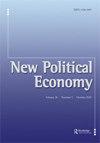文化与欧洲人对公共债务的态度
IF 3.8
2区 经济学
Q1 ECONOMICS
引用次数: 0
摘要
摘要大众媒体和政治家经常将一些欧盟国家的高公共债务归咎于文化差异。这些主张在将表面谨慎的北欧人与挥霍无度的南欧人进行对比的话语中最为明显。尽管这些和类似的叙述很突出,也有证据表明文化在其他经济结果中发挥着重要作用,但没有系统的证据表明文化会影响欧盟对主权债务的态度。我们对这一说法进行了首次实证检验,使用了233000多个对欧洲晴雨表关于国债显著性问题的回答。我们的分析表明,国家和次国家的差异几乎不能解释债务偏好的差异。此外,确实出现的差异不符合现有的文化叙事。进一步的分析表明,在国家和地区层面上,国家文化或宗教信仰的既定衡量标准与债务态度并不相关,正如文化论点所预测的那样。本文章由计算机程序翻译,如有差异,请以英文原文为准。
Culture & European attitudes on public debt
ABSTRACT Popular media and politicians have often blamed the high public debt of some EU countries on cultural differences. These claims are most apparent in the discourse contrasting ostensibly prudent Northern Europeans with spendthrift Southern Europeans. Despite the prominence of these and similar narratives and evidence that culture plays a nontrivial role in other economic outcomes, there is no systematic evidence that culture influences attitudes towards sovereign debt in the EU. We provide the first empirical test of this claim using over 233,000 responses to a Eurobarometer question about the salience of national debt. Our analysis reveals that national and sub-national differences explain very little of the variance in debt preferences. Further, the differences that do emerge do not fit existing cultural narratives. Additional analysis reveals that established measures of national culture or religious observance, at the national and regional levels, do not correlate with debt attitudes as cultural arguments would predict.
求助全文
通过发布文献求助,成功后即可免费获取论文全文。
去求助
来源期刊

New Political Economy
Multiple-
CiteScore
10.10
自引率
9.50%
发文量
41
期刊介绍:
New Political Economy aims to create a forum for work which combines the breadth of vision which characterised the classical political economy of the nineteenth century with the analytical advances of twentieth century social science. It seeks to represent the terrain of political economy scholarship across different disciplines, emphasising original and innovative work which explores new approaches and methodologies, and addresses core debates and issues of historical and contemporary relevance.
 求助内容:
求助内容: 应助结果提醒方式:
应助结果提醒方式:


